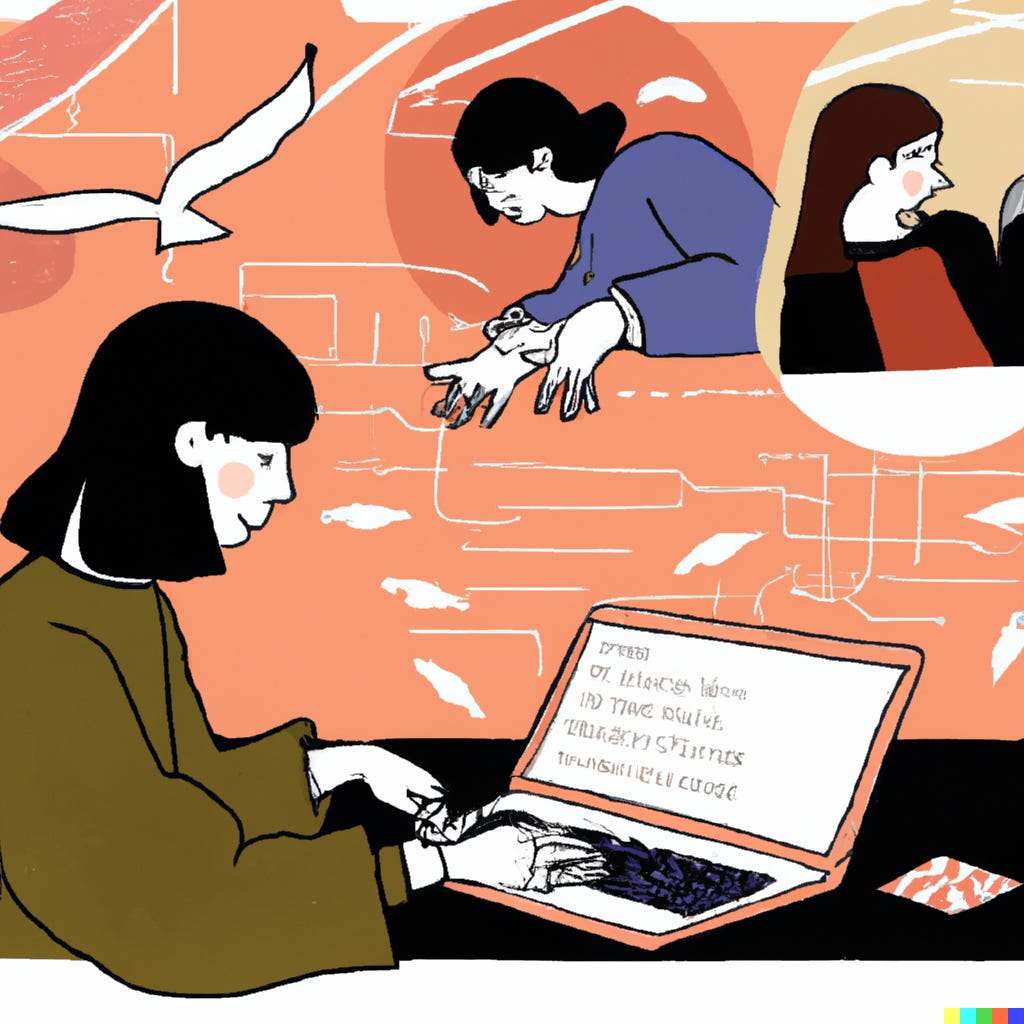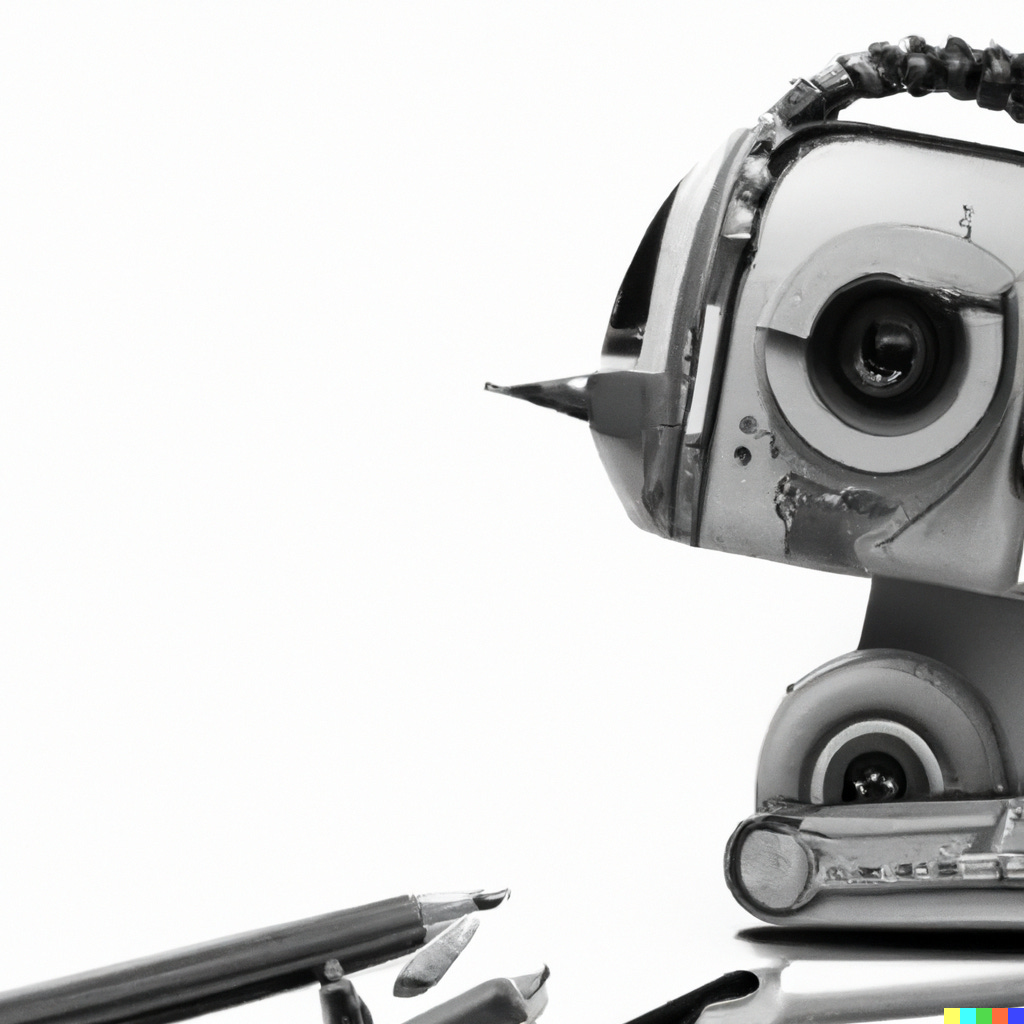Last week, Angie stopped by for lunch on her way through town. We got to talking with a few friends I’d gathered about the teaching of writing and AI. Later, Angie emailed me to ask about resources. This is my reply (touched up a bit for my whopping Substack readership of 69 souls—ha ha). The ideas, mostly from the field of composition studies, I take seriously, but I wrote it quickly and, believe it or not, in a playful spirit. I welcome response, with one eye squinted.
“A writing class full of students, some of whom feel the pull of AI and some of whom resist it fiercely.”
Dear Angie,
I’m sharing a couple of documents handed out by our Associate Provost at a couple of spring-term faculty meetings on the subject. They’re helpful as far as these things go. Chat GPT and AI are changing so fast it’s hard to keep up. In addition to reading about it, I encourage you and your students to play with it in the supervised “sandbox” of your class. You'll find a creative edge together fairly quickly, I imagine.
What follows is longer than you expected, but I used your question to do some gathering of thoughts that I’ve been wanting to articulate for a while.
You ask what detection tools I find useful. I don’t use detection tools. In fact, I expect students to use Chat GPT in their work; at the same time, I aim to create a writing environment in which 1) students learn to use Chat responsibly, and 2) their writing purposes cannot easily be addressed by using Chat. I haven't taught a fiction class this way, yet, but in Writing Seminar (gateway course to major) this was my goal.
At the time, Chat was brand new, so I could promote a spirit of discovery. We reacted to Chat together, noticing how our views differed and what our positions revealed about the presumptions we bring to writing. This was really fun. We shared discoveries, sometimes gasping (its sheer capacity, its speed!) and sometimes laughing out loud at Chat’s basic earnestness and desire to please. While I didn't have time or knowledge to develop deeply thought out lessons, I found it exhilarating to be "in the moment" with our work, and it occasioned asking vital questions about writing and the nature of writing that I hardly ever get to talk about with students (or anyone else).
A small example from among many amazing ideas by writing teachers: I asked half the class to describe their idea of the perfect date, and I asked the other half to ask Chat that same question. Then I mixed up the answers and we tried to figure out which was which. (I had the "key" to the list). As you might imagine, some students produced canned ideas; Chat, on the other hand, made you want to date it. This wasn't easy to take, and some students offered resisting but not very convincing interpretations, such as that the human produced responses just “felt” more real to them. We quickly discovered that Chat could mimic many voices, provide realistic details, and knew how a 20-something would think and speak.
Some of the following questions arose in our discussions, and some are ones I recently added. Yes, many of them have a post-structural bent. I suppose Chat could best me at coming up with these, but only one of us would be enjoying themselves in the process!
1. What makes writing good? Who gets to decide this? Is this definition stable?
2. Is good writing independent of purpose and occasion?
3. If so, can’t it also be independent of authorship?
4. If Chat is not expressing itself, then what is it doing?
5. Whatever that is, how do we know that isn't what we are doing?
6. Is Chat's writing automatically bad if it fakes being human or outperforms humans?
7. Is human writing automatically better than Chat-produced writing because it is produced by a human?
8. What is original writing? What is authorship? How do these ideas retain value?
9. What would we lose if humans could no longer write and Chat did it for us?
10. Where does meaning reside? How about creativity? Intentionality? Literacy? Value?
As a class, we didn’t get that far with the questions, but at least I posed them in a context that felt appropriate and, I hope, meaningful.
“A world in which only bots do the writing, never humans.”
A few other observations from class:
My students spent a long time trying to make Chat hallucinate because a few months ago that was a major vulnerability; I'm sure it's fixed by now. I also asked them to think about their prospective careers, how writing would be used in them, and what situations seemed foretold. Disconcerting, indeed, not just for the future journalists and creative writers but also for the future actuaries and design majors. (Visual AI, like Dall-E, is hopelessly noun-based, I might add.) They're coming for my job, too, but only because what most people believe the teaching of writing consists of can indeed be done by AI and probably should be.
One thing students greatly appreciated was Chat's assistance in developing their ideas. Most of them wanted to write their paper; they just didn't want to face the blank page. I can accept that. An interesting collaboration can ensue, if one doesn’t insist on citing less-than-satisfactory results as indication of Chat’s inferiority to humans. You tell Chat, "No, that's not quite what I meant," and you ask it to try again. It provides another version, you ask it to tweak this or that, and in the process you are learning about what you really want to say and how you want to say it. To me, this is a legitimate act of writing.
Of course, spelling, grammar and punctuation can now be Chat's job. For people whose use of writing will be mostly instrumental, this seems fine. It is still the case that students only seem to make use of such tools when they actually care about the writing they produced, so creating the conditions where they produce writing about which they feel that investment is by far my more pressing concern.
“We are thoroughly, inescapably intertextual.”
Finally, it was the creatives who took the longest to come 'round. "If Chat isn't alive and can't feel, then it isn't really expressive. What it's doing isn't real." But the truth is that Chat is a better expressive writer than some humans are, and it will only get better. Now, what's interesting about that to me is not so much that some humans are trite and not very well read, although that's true; it's that it should make us question what we think we mean by "expressive" writing in the first place. We presume a self. We presume inherence. We presume depth and individual sensation/sensibility. We believe description is mimetic and rarely bother to name the represented world as artificial because we’re so busy looking for reflections of ourselves.
And this is all fine, really. But writing doesn't care. What writing is and what it does happen independently of those useful illusions. Writing is utterly generative and constitutive, not documentary. We are thoroughly, inescapably intertextual. For me, writing class should not be a place to come make products or artifacts. (At least, don’t go into debt for it). It should be a place where as Diane Davis talks about, the very fact of writing — beyond even the idea of "process" as you talk about — reveals your finitude. All writing is by-product of an act whose significance has already happened to the writer: the writer has *undergone* the act of writing. All artists know this experience. And so long as writing is regarded as the act of merely communicating one's interiority, then its potency as anything more than a commodity featuring some interesting piece of "aboutness" remains near zero.
Writing is not connected to readers, it is connected to markets. This is how writing is taught, whether marketplace values are overt or simply exert influence over everything written and everything said. This isn’t evil, but in terms of human potential it’s tragically limited. This limitation doesn’t exist because of AI, but our fears of AI exist because of this limitation. "What if language were not an instrument of expression or mimesis but a field of semiotic, sonic, syntactic, and other relations that at once create the possibility and generate the instability of identity?" asks poet/critic John Yao. (You could ask Chat what it thinks of Yao’s idea. I found it a reasonable response.)
I believe writing is thinking, or, more specifically, that writing thinks us, uses us to think, and that AI will change our writing and our thinking as technology and writing (itself a technology) have always done.
Would love to talk more as we find opportunity.
Cheers,
Carol
“Writing thinks through us.” (From Chat: “Longer, more specific descriptions work best.”)
3 QUIICK RESOURCES
The rich body of thought and questioning produced in response to AI is too vast to name here. Here’s a brief start list.
Amy Letter’s Substack: Human in the Post-Human World
What I did tell students in this class, in case any administrators are hyperventilating:
This Unit in Writing Seminar is a critical, creative, and philosophical exploration of Chat GPT and other forms of AI. It will require intentional use of AI in ways that are traditionally considered forms of academic dishonesty.
In the spirit of "growth mindset" we will curate a context for understanding through reading, research, collaboration and experimentation.
I do not condone or encourage any form of academic dishonesty in any way, for any reason, in this class or any other class.
In this class, we may commit purposeful plagiarism or academic dishonesty with a safely-defined duration and environment for purposes of discovery and learning.
Do not use AI to commit any form of academic dishonesty as defined by the Student Handbook outside of the approved assignments for doing so in Unit 2. If you are unsure, ask.
I will make very clear when it is okay to use Chat "dishonestly" and to what extent, and when it is not okay. Students are expected to identify results achieved by AI in their work and, when requested, to reflect thoughtfully on those results.








This is so wonderful! I want to use this as the introductory essay for my Fall ‘23 Writing in a Networked World course!! 🦾 (And thank you for the nod!) ☺️
I like this idea of using Chat responsibly and as a discussion prompt. One comforting thing is that AI can’t yet duplicate high level scholarly discourse or generate a new idea for literary scholarship. This bodes well for upper level classes, but it does seem like lower level courses need reframing with more emphasis on refining first drafts? And some students will rely on AI for “good enough” work. Lots more to dig into when I have time!